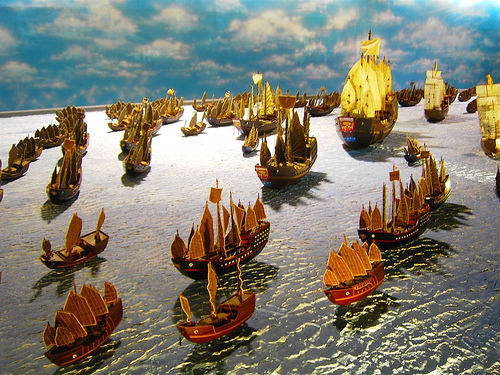The Fall of the Malacca Sultanate: A Pivotal Moment in History

What if a thriving port city, a hub of trade and cultural exchange, suddenly vanished from its position of power? This isn't a hypothetical scenario; it's the story of the fall of the Malacca Sultanate, a pivotal event that reshaped the political landscape of Southeast Asia and had ripple effects across the globe. This article delves into the complex tapestry of events that led to the demise of this once-powerful empire.
The Malacca Sultanate, founded in the late 14th century, quickly rose to prominence as a major trading center connecting East and West. Its strategic location along the Strait of Malacca, a vital maritime chokepoint, allowed it to control the flow of goods between the Indian Ocean and the South China Sea. Merchants from China, India, Arabia, and beyond flocked to its bustling ports, exchanging spices, silks, porcelain, and other valuable commodities. However, this prosperity also attracted unwanted attention, ultimately leading to its downfall.
The decline of the Malacca Sultanate began with internal strife and succession disputes, weakening its political stability. These internal vulnerabilities made it a prime target for external forces seeking to capitalize on its strategic importance. The Portuguese, driven by their ambition to control the lucrative spice trade, arrived in Malacca in 1509. Led by Afonso de Albuquerque, they launched a series of attacks, culminating in the conquest of Malacca in 1511.
The Portuguese conquest of Malacca marked a turning point in Southeast Asian history. The fall of the sultanate not only ended its dominance in the region but also ushered in an era of European colonialism. The Portuguese established a fortified trading post in Malacca, disrupting the existing trade networks and redirecting the flow of goods towards Europe. The impact of this shift was felt throughout the region, as other kingdoms struggled to adapt to the new geopolitical realities.
Understanding the fall of Malacca is crucial for grasping the broader historical context of Southeast Asia. It highlights the interplay of internal and external factors that can contribute to the decline of even the most powerful empires. The events surrounding Malacca's demise serve as a cautionary tale about the importance of political stability, the dangers of external threats, and the lasting consequences of colonial intervention.
The fall of the Malacca Sultanate had profound consequences, contributing to the rise of new regional powers like Johor and Aceh. It also facilitated the spread of Islam throughout the archipelago, as Malay traders and scholars dispersed to other parts of Southeast Asia. The Portuguese presence, while disruptive, also introduced new technologies and cultural influences, further shaping the region's development.
Although primarily negative, one could argue a potential "benefit" was the decentralization of power. The fall of Malacca led to the emergence of other smaller, independent sultanates, fostering a more diverse political landscape. However, this fragmentation also led to increased competition and conflict between these emerging powers.
Advantages and Disadvantages of the Fall of Malacca
| Advantages | Disadvantages |
|---|---|
| Decentralization of Power (arguably) | Loss of Regional Dominance |
| Start of European Colonialism | |
| Disruption of Existing Trade Networks |
Frequently Asked Questions
What were the main factors that led to the fall of the Malacca Sultanate? Internal strife, succession disputes, and the Portuguese conquest.
Who led the Portuguese conquest of Malacca? Afonso de Albuquerque.
When did Malacca fall to the Portuguese? 1511.
What was the significance of Malacca's strategic location? It controlled the vital Strait of Malacca, a major maritime trade route.
What were the consequences of the fall of Malacca? The rise of new regional powers, the spread of Islam, and the beginning of European colonialism in Southeast Asia.
How did the fall of Malacca impact the spice trade? It disrupted existing trade networks and redirected the flow of spices towards Europe.
What happened to the Malay rulers after the fall of Malacca? They established new sultanates in other parts of the region, such as Johor and Perak.
What are some resources for learning more about the fall of Malacca? History books focusing on Southeast Asian history and online academic resources.
The fall of the Malacca Sultanate represents a significant turning point in Southeast Asian history. Its decline from a powerful trading empire to a Portuguese colony highlights the complex interplay of internal weaknesses and external pressures. Understanding this historical event provides valuable insights into the dynamics of power, trade, and colonialism in the region. It underscores the importance of political stability, adaptability, and the enduring impact of historical events on the present day. Further exploration of this pivotal moment in history can shed light on the rich cultural heritage and complex political landscape of Southeast Asia. We encourage readers to delve deeper into the history of the Malacca Sultanate and its lasting legacy.
Anticipating on a leash 131 exploring dynamics and developments
Unlocking aesthetics elevate your pc with stunning 4k wallpapers
Unlocking magnetisms magic for curious kids









